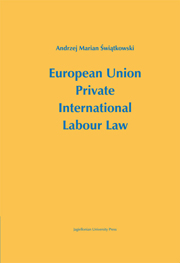Book contents
- Frontmatter
- Contents
- Introductory Comments
- Part I Preliminary Part
- Part II Conflicts of law of individual labour law in the light of the Rome Convention of June 19, 1980 and Regulation of the European Parliament and the Council of the European Communities No. 593/2008 of June 17, 2008 on the law applicable to contractual obligations (“Rome I”)
- Chapter 1 Rome Convention
- Chapter 2 Resolving conflicts of substantive labour law in the Rome Convention (“Rome I”)
- Chapter 3 Converting the Rome Convention into Regulation No. 593/2008 (“Rome I”)
- Part III Conflict of law issues in individual labour law in light of the Regulation (EC) No. 864/2007 of the European Parliament and the Council of the EU (July 11, 2007), concerning law applicable to Non-Contractual Obligations (“Rome II”)
- Part IV Conflicts of law in collective labour law
- Part V Conflicts of law in social security – the coordination of national social security systems of EU Member States according to the regulation of the European Parliament and Council Regulation (EC) No. 883/2004 of April 29, 2004 on the coordination of social security systems
- Part VI International procedural labour law of the European Union
- Selected bibliography
Chapter 3 - Converting the Rome Convention into Regulation No. 593/2008 (“Rome I”)
from Part II - Conflicts of law of individual labour law in the light of the Rome Convention of June 19, 1980 and Regulation of the European Parliament and the Council of the European Communities No. 593/2008 of June 17, 2008 on the law applicable to contractual obligations (“Rome I”)
Published online by Cambridge University Press: 05 September 2014
- Frontmatter
- Contents
- Introductory Comments
- Part I Preliminary Part
- Part II Conflicts of law of individual labour law in the light of the Rome Convention of June 19, 1980 and Regulation of the European Parliament and the Council of the European Communities No. 593/2008 of June 17, 2008 on the law applicable to contractual obligations (“Rome I”)
- Chapter 1 Rome Convention
- Chapter 2 Resolving conflicts of substantive labour law in the Rome Convention (“Rome I”)
- Chapter 3 Converting the Rome Convention into Regulation No. 593/2008 (“Rome I”)
- Part III Conflict of law issues in individual labour law in light of the Regulation (EC) No. 864/2007 of the European Parliament and the Council of the EU (July 11, 2007), concerning law applicable to Non-Contractual Obligations (“Rome II”)
- Part IV Conflicts of law in collective labour law
- Part V Conflicts of law in social security – the coordination of national social security systems of EU Member States according to the regulation of the European Parliament and Council Regulation (EC) No. 883/2004 of April 29, 2004 on the coordination of social security systems
- Part VI International procedural labour law of the European Union
- Selected bibliography
Summary
Conventions are included within the category of sources of international law whose validity is clear from the authorities of Member States’ obligations to comply with its provisions. The Rome Convention also has such character. Despite the fact that the European Union Member States are obligated to ratify and comply with the standards set out in the conflict of law Convention, neither the authorities of the Member States nor EU institutions have a legal obligation to apply the Convention. For this reason, the European Commission has taken action to transform the Rome Convention into the Regulation of the European Parliament and the Council of the European Communities. Passed on June 17, 2008 Regulation No. 593/2008 on the law applicable to contractual obligations (“Rome I”) was preceded by consultations in the communities concerned to protect the interests of individuals, primarily consumers and issues of private international law – lawyers with university backgrounds and judges. The consultation was a report prepared by the Commission of the European Union on the conversion of the Rome Convention into a legal instrument of the European Communities. Over the next eight months all stakeholders – individuals and institutions – had the opportunity to make observations on the changes necessary to transform the occasion of the Rome Convention for the Regulation of the European Parliament and the Council of the EC should be made in the process of preparing a primary source of private international law of the European Union.
- Type
- Chapter
- Information
- European Union Private International Labour Law , pp. 140 - 152Publisher: Jagiellonian University PressPrint publication year: 2012



